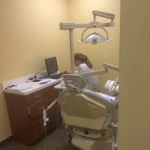- 1-Understanding-Teeth-Grinding-During-Sleep
- 2-Common-Causes-of-Bruxism-and-How-They-Impact-You
- 3-Symptoms-and-Effects-of-Teeth-Grinding-on-Your-Dental-Health
- 4-Lifestyle-Changes-to-Reduce-Teeth-Grinding
- 5-Dental-Solutions-for-Managing-Teeth-Grinding
- 6-When-to-See-a-Dentist-and-Professional-Help-for-Bruxism
1. Understanding Teeth Grinding During Sleep
Teeth grinding, medically known as bruxism, is a common sleep disorder characterized by involuntary clenching or grinding of teeth. It can occur during the day but is most problematic at night, often going unnoticed by the sleeper. Understanding how to fix teeth grinding during sleep begins with recognizing this condition and its implications.
Bruxism can lead to tooth wear, jaw pain, headaches, and disrupted sleep quality. While it affects people of all ages, adults under stress or with certain dental issues are particularly prone. Addressing bruxism early can prevent long-term damage and improve overall health.
2. Common Causes of Bruxism and How They Impact You
Several factors contribute to teeth grinding during sleep, including stress, anxiety, abnormal bite alignment, and sleep disorders such as sleep apnea. Lifestyle factors like caffeine or alcohol consumption can exacerbate symptoms.
Understanding these causes helps in identifying the root triggers for your bruxism. For example, during periods of high stress, many individuals experience increased nighttime grinding. This insight is critical when considering treatment options to fix teeth grinding during sleep.
3. Symptoms and Effects of Teeth Grinding on Your Dental Health
Common symptoms include jaw soreness, worn or chipped teeth, earaches, and frequent headaches upon waking. Chronic bruxism can cause serious dental damage, leading to tooth sensitivity, fractures, or even loss.
Many individuals are unaware they grind their teeth until a dentist identifies the signs during routine exams. Recognizing these symptoms early is essential to prevent complications.
4. Lifestyle Changes to Reduce Teeth Grinding
Simple lifestyle adjustments can significantly reduce teeth grinding. Stress management techniques such as meditation, exercise, or therapy help lower anxiety levels. Avoiding stimulants like caffeine and alcohol before bedtime also decreases bruxism episodes.
Maintaining good sleep hygiene—consistent sleep schedules, a relaxing bedtime routine, and a comfortable sleep environment—supports restful sleep and reduces grinding.
5. Dental Solutions for Managing Teeth Grinding
For persistent cases, dental interventions are effective. Custom-made night guards protect teeth from damage by providing a physical barrier between upper and lower teeth during sleep.
Orthodontic treatments or bite adjustments may be necessary if misalignment contributes to grinding. Dentists can tailor solutions based on individual assessments to fix teeth grinding during sleep effectively.
6. When to See a Dentist and Professional Help for Bruxism
If you suspect you grind your teeth at night, seeking professional advice is crucial. Dentists can diagnose bruxism, recommend appropriate treatments, and monitor your progress.
Severe cases may require collaboration with sleep specialists or mental health professionals to address underlying sleep disorders or psychological triggers.
For expert care, visit Dentistry Toothtruth, where specialized treatment options and personalized plans help you stop teeth grinding and protect your smile.
Take Action to Fix Teeth Grinding During Sleep
Understanding how to fix teeth grinding during sleep empowers you to take control of your dental health. By combining lifestyle changes with professional dental care, you can reduce grinding, prevent damage, and enjoy better sleep quality.
Early intervention is key. If you notice symptoms or suspect bruxism, consult your dentist promptly. Resources at Dentistry Toothtruth offer trusted guidance and effective treatment options to help you maintain a healthy, pain-free smile for years to come.







 Andrew Morris, DDS5.0 (16 review)
Andrew Morris, DDS5.0 (16 review) Dr. Daniel S. Fife, DDS4.0 (31 review)
Dr. Daniel S. Fife, DDS4.0 (31 review) Superior Smiles3.0 (23 review)
Superior Smiles3.0 (23 review) Root Cause Dentistry- Biological Dentist0.0 (0 review)
Root Cause Dentistry- Biological Dentist0.0 (0 review) Downtown Dental Center4.0 (114 review)
Downtown Dental Center4.0 (114 review) Distinctive Smiles of Dublin4.0 (399 review)
Distinctive Smiles of Dublin4.0 (399 review) The Importance of Oral Health Education During Pregnancy for a Healthy Pregnancy
The Importance of Oral Health Education During Pregnancy for a Healthy Pregnancy Best Tips for Brushing Your Teeth Properly for Healthy Gums: Essential Techniques for Oral Health
Best Tips for Brushing Your Teeth Properly for Healthy Gums: Essential Techniques for Oral Health Why Skipping Dental Checkups Can Lead to Bigger Oral Health Problems
Why Skipping Dental Checkups Can Lead to Bigger Oral Health Problems Advantages of Porcelain Dental Restorations
Advantages of Porcelain Dental Restorations How Can Diabetes Cause Tooth and Gum Problems? Preventing and Managing Oral Health Issues
How Can Diabetes Cause Tooth and Gum Problems? Preventing and Managing Oral Health Issues Healthy Habits for Promoting Good Oral Health and Hygiene: Tips for a Healthy Smile
Healthy Habits for Promoting Good Oral Health and Hygiene: Tips for a Healthy Smile